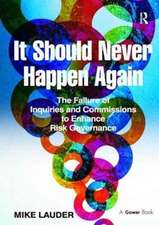Neuroliberalism: Behavioural Government in the Twenty-First Century: Economics in the Real World
Autor Mark Whitehead, Rhys Jones, Rachel Lilley, Jessica Pykett, Rachel Howellen Limba Engleză Paperback – 6 sep 2017
Neuroliberalism presents the results of the first critical global study of the impacts of the behavioural sciences on public policy and government actions, including behavioural economics, behavioural psychology and neuroeconomics. Drawing on interviews with leading behaviour change experts, organizations and policy-makers, and discussed in alignment with a series of international case studies, this volume provides a critical analysis of the ethical, economic, political and constitutional implications of behaviourally oriented government. It explores the impacts of the behavioural sciences on everyday life through a series of themes, including: understandings of the human subject; interpretations of freedom; the changing form and function of the state; the changing role of the corporation in society; and the design of everyday environments and technologies.
The research presented in this volume reveals a diverse set of neuroliberal approaches to government that offer policy-makers and behaviour change professionals a real choice in relation to the systems of behavioural government they can implement. This book also argues that the behavioural sciences have the potential to support much more effective systems of government, but also generate new ethical concerns that policy-makers should be aware of.
| Toate formatele și edițiile | Preț | Express |
|---|---|---|
| Paperback (1) | 418.07 lei 6-8 săpt. | |
| Taylor & Francis – 6 sep 2017 | 418.07 lei 6-8 săpt. | |
| Hardback (1) | 764.20 lei 6-8 săpt. | |
| Taylor & Francis – 6 sep 2017 | 764.20 lei 6-8 săpt. |
Preț: 418.07 lei
Nou
Puncte Express: 627
Preț estimativ în valută:
80.01€ • 86.88$ • 67.21£
80.01€ • 86.88$ • 67.21£
Carte tipărită la comandă
Livrare economică 22 aprilie-06 mai
Preluare comenzi: 021 569.72.76
Specificații
ISBN-13: 9781138923836
ISBN-10: 1138923834
Pagini: 236
Ilustrații: 28
Dimensiuni: 156 x 234 x 24 mm
Greutate: 0.34 kg
Ediția:1
Editura: Taylor & Francis
Colecția Routledge
Seria Economics in the Real World
Locul publicării:Oxford, United Kingdom
ISBN-10: 1138923834
Pagini: 236
Ilustrații: 28
Dimensiuni: 156 x 234 x 24 mm
Greutate: 0.34 kg
Ediția:1
Editura: Taylor & Francis
Colecția Routledge
Seria Economics in the Real World
Locul publicării:Oxford, United Kingdom
Public țintă
Postgraduate and UndergraduateCuprins
Chapter 1 NeuroliberalismChapter 2 An Historical Geography of Neuroliberalism I: applying behavioural insights
Chapter 3 An Historical Geography of Neuroliberalism II: on new behavioural ideas
Chapter 4 The Neuroliberal Subject: Rethinking human nature and reinventing the self.
Chapter 5 Redefining freedom. Neuroliberal autonomy and citizenship
Chapter 6 The Neuroliberal state
Chapter 7 The Neuroliberal corporation
Chapter 8 Neuroliberal environments: design, contexts and materiality
Chapter 9 Practical Interventions in Neuroliberalism: Mindfulness and Behaviour Change
Bibliography
Methodological Appendix
Chapter 3 An Historical Geography of Neuroliberalism II: on new behavioural ideas
Chapter 4 The Neuroliberal Subject: Rethinking human nature and reinventing the self.
Chapter 5 Redefining freedom. Neuroliberal autonomy and citizenship
Chapter 6 The Neuroliberal state
Chapter 7 The Neuroliberal corporation
Chapter 8 Neuroliberal environments: design, contexts and materiality
Chapter 9 Practical Interventions in Neuroliberalism: Mindfulness and Behaviour Change
Bibliography
Methodological Appendix
Recenzii
'[This book] shows how Behavioural Insights ‘works’ in a politico-strategic sense. It brings a deeper historical understanding and sketches out interesting (alternative) directions – such as ‘collaborative nudging’ – for the field. In a time in which ‘what works’ dominates in both policy research and policy practice, this book therefore provides a refreshing reflection.' - Joram Feitsma, Utrecht University
‘Indispensable and provocative reading for everyone interested in behavioral science, and its growing impact on everyday life. A terrific, fact-filled overview, it is also genuinely original, and it manages a neat trick. It is both highly illuminating and a lot of fun!’ — Cass R. Sunstein, co-author of Nudge and former Administrator, White House Office of Information and Regulatory Affairs
‘An outstanding critical contribution to debates on behavioural change. Neuroliberalism carefully articulates the impacts of the behavioural sciences on public policy and illustrates the ways in which neuroliberal government is both promoted and contested. It offers a unique insight into the history, philosophy and practice of "behavioural government" that we should all take note of.’ — Stewart Barr, Professor of Geography, University of Exeter, UK.
‘Indispensable and provocative reading for everyone interested in behavioral science, and its growing impact on everyday life. A terrific, fact-filled overview, it is also genuinely original, and it manages a neat trick. It is both highly illuminating and a lot of fun!’ — Cass R. Sunstein, co-author of Nudge and former Administrator, White House Office of Information and Regulatory Affairs
‘An outstanding critical contribution to debates on behavioural change. Neuroliberalism carefully articulates the impacts of the behavioural sciences on public policy and illustrates the ways in which neuroliberal government is both promoted and contested. It offers a unique insight into the history, philosophy and practice of "behavioural government" that we should all take note of.’ — Stewart Barr, Professor of Geography, University of Exeter, UK.
Descriere
Neuroliberalism presents the results on the first critical global study of the impacts of the behavioural sciences on public policy and government actions, including behavioural economics, behavioural psychology and neuroeconomics. Drawing on interviews with leading behaviour change experts, organizations, and policy-makers, and discussed in alignment with a series of international case studies, this volume provides a critical analysis of the ethical, economic, political and constitutional implications of behaviourally oriented government. It explores the impacts of the behavioural sciences on everyday life through a series of themes, including: understandings of the human subject; interpretations of freedom; the changing form and function of the state; the changing role of the corporation in society; and the design of everyday environments and technologies.




























